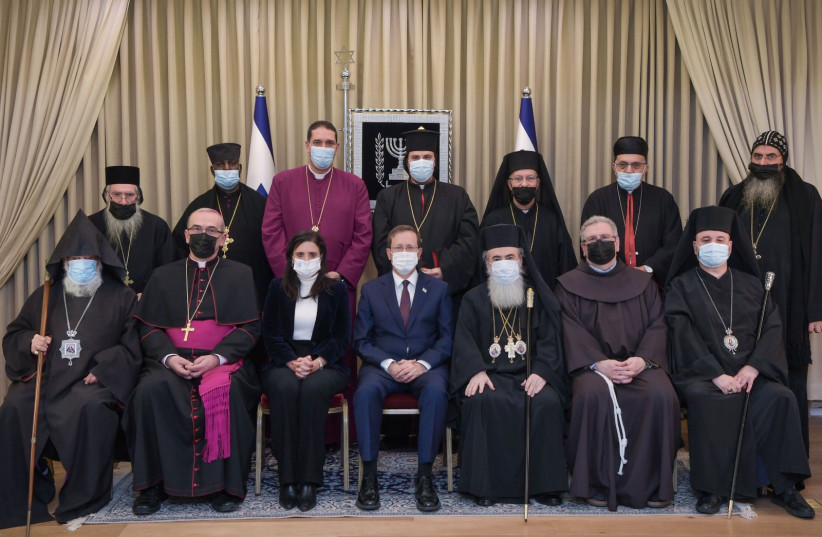President Isaac Herzog and Interior Minister Ayelet Shaked each affirmed their commitment to freedom of worship and religion in the Holy Land, adding that all forms of discrimination will be rejected. Their comments came amid a backdrop of public statements by heads of churches in Israel claiming that verbal and physical assaults by Jewish radicals against Christians are worse than ever.
While appreciative of the two declarations, Greek Orthodox Patriarch Theophilos III could not help but respond, “In a state committed to the historic rights of the various religious communities, as well as to religious freedom, we cannot but call out the activities in Jerusalem of fringe radical groups who are in no way representative of the State of Israel or the Jewish people. The action of these extremists is a direct assault against our shared values and ideals that we hold as essential for the good order and flourishing of our common life. For we all must work together to curb these unbridled ambitions of all radicals within our communities for the well-being and safety of all our peoples. We, the heads of churches, reaffirm our commitment to engage in urgent dialogue on this issue as declared in our recent statement.”
While not specifying who these Jewish radicals are, the patriarch mentioned that their ambition is for the Holy Land to be populated only by Jews. It was for this reason, said Theophilos, that church leaders are particularly appreciative of Herzog’s steadfast commitment to the integrity, multi-cultural, multi-ethnic and multi-religious landscape of the region.
Herzog, Shaked and Theophilos were speaking at the annual New Year reception hosted by the president of Israel for the spiritual and lay leaders of Christian churches and communities. The reception is traditionally held between the dates of the Latin and Eastern Christmas. Approximately 100 spiritual and lay leaders representing the various Christian denominations filled the main hall at the President’s Residence on Wednesday.
Herzog said that each of the different Christian groups in the Holy Land was a blessing, and was an integral part of the mosaic of Israeli society.

“We are all the children of the same God,” he said, underscoring unity in the belief of the need for kindness, charity and mercy. This is the time to build a new partnership among the faiths of the Middle East, he added.
In emphasizing his commitment to the preservation of freedom of worship, Herzog said he rejected all forms of racism, discrimination and extremism, as well as any threat to Christian communities in the Holy Land.
Speaking on behalf of his wife, Michal, who was present, Herzog assured his guests, “Our home is your home and my door is always open. May we work together to expand the circle of peace and tolerance.”
Shaked said that 2022 was a year in which “to build new bonds of friendship and cooperation” among all religions. “While we may have different beliefs, we all have a deep love for the Holy Land,” she said, adding that unlike in most of the Middle East, Christian communities in Israel continue to grow, according to the recent report by the Central Bureau of Statistics.
Shaked said she was also proud that her ministry is able to support the development of Christian holy sites, and expressed hope that Christian pilgrims would return as soon as possible.
She also urged the Christian leadership to encourage their communities to get vaccinated, and to vaccinate their children, so that there could be inter-religious harmony, tolerance and respect.
Theophilos spoke in a similar vein, saying the pandemic has had a devastating effect on local Christian communities as well as on the pilgrims who have been unable to travel to visit the holy places.
The message of heads of churches is taken from the scriptures, he said. It is simply to “love thy neighbor.” With love and commitment to this common commandment, Theophilos said he was convinced that all communities in Israel “can continue to thrive and to hold Jerusalem and the Holy Land as a beacon of light, hope and peace to the world at large.”
Judging by the attendance, the Church, like the synagogue, is still very much a male-dominated domain in terms of leadership.
There were very few women present, and hardly any nuns, whereas in past years nuns came in small groups and were denoted by the color and design of their habits.
